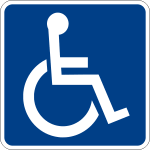The law

It may seem like the last thing a smaller business needs to take into consideration, when times are tough, is catering to a minority group, and it is easy to resent these legal impositions on your business or organisation and the threat of legal action. However, let’s focus on the pros rather than the cons.
Positive reasons for accommodating people with disability
There are positive reasons for taking these regulations on board and following the relevant steps to implement them, other than merely from social responsibility or legal pressure — some of them make sound commercial sense too:
- If your business or organisation doesn’t fully cater for people with disability, you may well lose custom to others that do. Remember, it is in no way out of the ordinary for any given party of people to have, amongst their number, somebody with physical limitations.
- A business or organisation that doesn’t cater for people with a disability — because the necessary facilities are lacking or half-hearted — creates an aura of negativity and ill-feeling. It is important to welcome all clientele and make them feel comfortable so they are encouraged to return.
If you think that disabled facilities are universally incorporated already, think again. Many businesses within the tourist industry in Britain are not able to properly accommodate people with a disability. There are 11 million people in Britain who suffer a degree of disability, so such businesses must be missing out somewhere.
- Don’t forget this applies to employees as well, equal opportunities means making reasonable efforts to accommodate the needs of employees with disabilities.
Imagine yourself in a similar position, how would you feel if you were prevented from
participating in an activity, getting a job or accessing an area because of your physical disadvantages?
Disabled toilet facilities in a UK McDonalds restaurant. Image courtesy of Wikipedia.
Washroom facilities that accommodate disability
According to International Workplace: “The minimum dimensions for a disabled toilet cubicle is 2.2m by 1.8m, and must have a turning circle of 1.5m in diameter to accommodate a wheelchair…any company that can expect disabled people to be using its building needs to provide toilet facilities, and make them accessible for disabled people to reach from a car park, or the front of the building, completely unaided.”
There are other adaptations that need to be incorporated, some of which most abled-bodied people would probably never consider:
- A suitably positioned washbasin
- Handrails for support
- Strategically placed shelving
- A dedicated yellow bin, for safely disposing of needles used by people who self-medicate with insulin
- A hook to support colostomy bags
- An emergency cord in easy reach of the floor that can be pulled to alert somebody for assistance
- And a modesty blanket, to provide some basic privacy and alleviate the embarrassment for anyone who finds themselves in an awkward situation and in need of a strangers help
Our specialist team at Spectrum Interiors are dedicated to providing all commercial environments with a bespoke washroom design which delivers on both practicality and style. Don’t hesitate to contact us by telephone or online today for further information.
